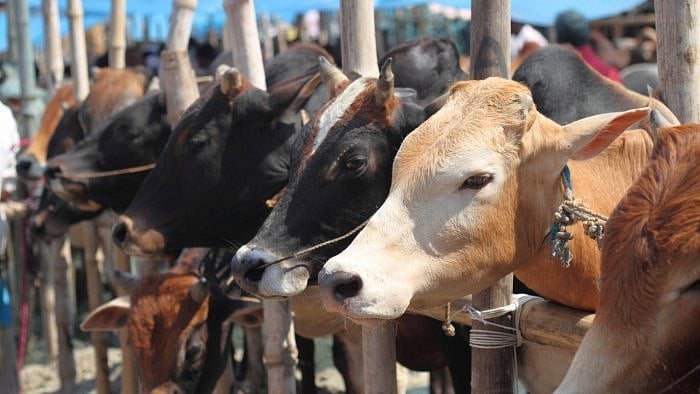
While the state government brought in the Karnataka Prevention of Slaughter and Preservation of Cattle Act, 2020, with the stated purpose of protecting cattle and increasing the breed of cattle, not only are these ambitions “misplaced” but they have a detrimental impact on the cattle rearing and market ecosystem, a study has found.
The study was led by public health specialist Sylvia Karpagam and independent researcher Siddharth Joshi.
The study report “Criminalising Livelihoods, Legalising Vigilantism” analyses the impact of the legislation on various communities including farmers, cattle transporters, slaughterhouses, skin and hide curing units, butchers, eateries and consumers.
It states that the justification provided by the government to implement the Act “betrays a complete lack of understanding of how the cattle production cycle works, and the utter disregard for the destructive impact it is going to have on the lives, incomes and livelihoods of the those who are part of the long chain of economic activities sustained by slaughter of cattle...”
While farmers usually sell unproductive cattle to traders who transport them to slaughterhouses, the new legislation which prohibits the slaughter of bulls, bullocks and buffaloes (below the age of 13 years), criminalizes traders who buy cattle for slaughter. Without an option to sell unproductive animals, farmers have to continue taking care of the animal making it economically unviable, it says. The report also highlights farmers lamenting how the legislation portrays them like criminals, leaving them vulnerable to vigilantes.
Further, the measures proposed by the government for mitigation of these adverse impacts are also impractical, it points out. For instance, while the government has proposed to take care of stray cattle in gaushalas, it doesn’t solve the economic loss to the farmers from being unable to sell the unproductive cattle. The report also quotes stakeholders who point out that cattle aren’t fed properly in gaushalas and they are sold on the sly.
Considering that Karnataka is grappling with malnutrition, the researchers emphasize the importance of beef as a nutrition source.
Speaking to DH, Karpagam demanded that the government revoke the Act.
“Else, it should at least allow slaughter of all other animals such as ox and bull. Now the exemption is allowed only for buffalo, which people in Karnataka do not consume,” she said.
The report was an initiative by a group of researchers part of Ahaara Namma Hakku collective.
Watch the latest DH Videos here:
